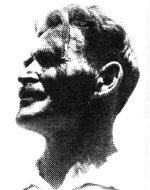Zeid, Alexander
Son of Rivka and Yitzhak Eliyahu. Born in 1886 in Irkutsk, Siberia, Russia, his father was a well-educated Jew, imbued with Ahavat Zion, and his mother was a member of a subbotnik family, who first studied in the cheder, then in a government elementary school. At the age of fifteen, his father died, and then the burden of supporting the household and the management of the family foundry was established, and at the same time a group of Poalei Zion was formed in Vilna and Alexander was one of its first members. When asked what he would do in Israel, he said, “I will work there, I will live there.” This answer reflected the simplicity, honesty and seriousness that characterized the man during his lifetime. He worked in the village of Zichron Yaakov, where he was wounded in a violent incident with Arabs and suffered from this injury all his life, and then moved to Jerusalem where he worked as a locksmith. He was one of the founders of the Hashomer organization and for fifteen years was active in the framework of the organization. He took part in the establishment of new settlement points in Tel-Adashim, Kfar Giladi and Tel Hai, and participated in defending the settlements against Arab attacks on the settlers. He dreamed of setting up workers’ moshavim and guards at the borders of the country, which would combine earthwork and guarding, and wandered according to the orders of the “guard” from the moshav to the moshava, fulfilling his role with exemplary responsibility. In 1916 he immigrated with his friends from Hashomer to settle in Kfar Giladi and became a farmer working in the land. In 1926 he moved with his family and a group of shepherds from Kfar Giladi to Shikh-Abirk (“Givot Zeid”) and became the custodian of the Jewish National Fund in the area. He was the link between Hashomer and the Society of Guards, guiding and imparting a legacy to the new generation of guards. Despite many hardships, he clung with his family to the soil of the place, and this was an example of faith, courage and willingness to sacrifice to many. In addition, his name was widely publicized as a guest and cultivated close ties and good neighborly relations with the surrounding Arabs. During his tour of the area he discovered ancient tombs in the hills that belonged to Abirak and the archaeological excavations that were opened due to this discovery. Zaid did not let go of his efforts to make peace between Jews and Arabs, but these efforts did not bear fruit. On the 12th of Tammuz, 11.7.1938, on his way from Abirk to Kevutzot Alonim, an Arab gang of murderers ambushed him and he was shot and killed. He was laid to rest in the cemetery of the Society of Guardians in the hills of Zeid. He left a wife, three sons and a daughter. Zaid’s murderer was discovered in 1942 by members of the Palmach, was brought to the field court of the Palmach, tried and executed. Son Giora says that his father’s blood was redeemed and the disgrace was removed from his sons’ heads and they could stand straight. The Arabs of the neighborhood also showed greater respect for the sons of Zeid, saying, “You are a faction of the tribe of the ancient Israelites, who are not harmed without punishment.” A huge statue erected in memory of one of the hills near his house – a guard riding his horse – became a symbol of the heroism of the guards. The chapters of his life were immortalized in the book Alexander Zeid – the story of his life. Habas, as well as in the books “Hashomer”; “Sejera – History and its personalities” and in “Dreaming and Fighting”.
